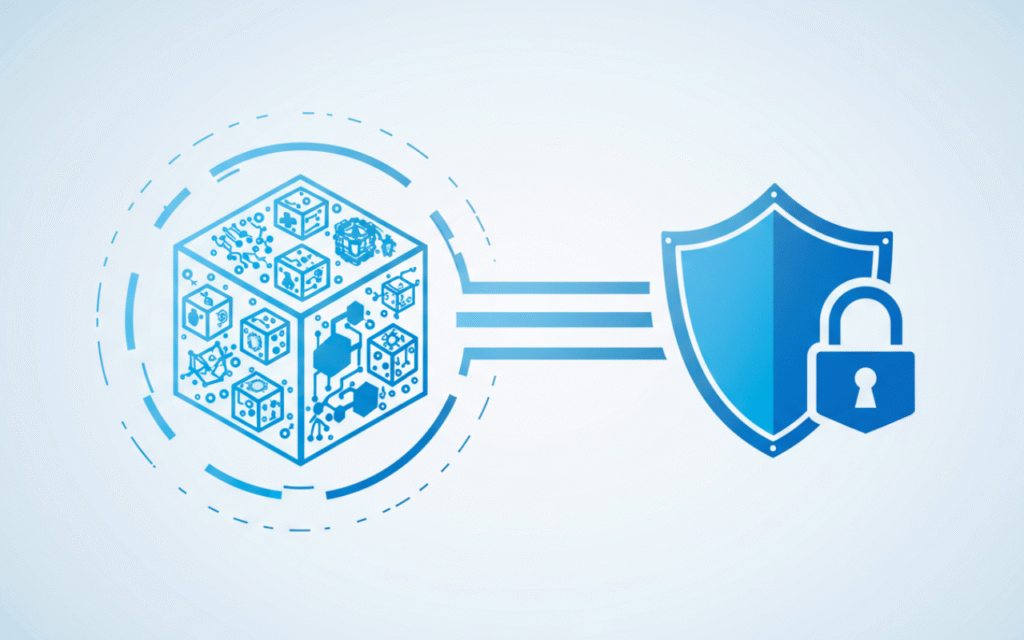In today’s digital age, cybersecurity has become a critical concern for individuals, businesses, and governments alike. With the increasing sophistication of cyberattacks and the growing volume of sensitive data being stored and transmitted online, protecting digital assets is more important than ever. Amid these challenges, blockchain technology has emerged as a promising solution to enhance cybersecurity. Originally developed as the underlying technology for cryptocurrencies like Bitcoin, blockchain has evolved into a versatile tool with applications across various industries, including cybersecurity.
In this blog post, we will explore how blockchain technology strengthens cybersecurity frameworks, its unique attributes that make it a game-changer, and its potential to address some of the most pressing security challenges of our time.

Understanding Blockchain Technology
At its core, blockchain is a decentralized and distributed ledger system that records transactions in a transparent and tamper-resistant manner. Unlike traditional centralized systems, where data is stored on a single server or database, blockchain operates on a network of nodes (computers) that work together to validate and store information. Each transaction is grouped into a “block“, and these blocks are linked in chronological order to form a “chain“. Once recorded on the blockchain, data is immutable, it cannot be altered or deleted without consensus from the network.
The key features of blockchain technology, decentralization, transparency, immutability, and cryptographic security. Make it an ideal candidate for addressing many cybersecurity challenges.
Key Ways Blockchain Enhances Cybersecurity
Blockchain technology significantly bolsters cybersecurity by providing a decentralized and tamper-proof system that ensures data integrity, enhances transparency, and prevents unauthorized access, thereby safeguarding sensitive information from cyber threats and attacks.
1. Decentralized Data Storage
One of the primary vulnerabilities in traditional cybersecurity systems is the reliance on centralized databases. Centralized systems create single points of failure, making them attractive targets for hackers. A breach in such systems can lead to massive data leaks, as seen in high-profile incidents involving financial institutions, healthcare providers, and government agencies.
Blockchain eliminates this risk by decentralizing data storage. Instead of storing information in one location, blockchain distributes it across a network of nodes. This decentralized architecture makes it significantly harder for attackers to compromise the system, as they would need to simultaneously breach multiple nodes to alter or access data.
2. Enhanced Data Integrity
Data integrity is critical in cybersecurity, especially in sectors like finance, healthcare, and supply chain management. Blockchain’s immutable ledger ensures that once data is recorded, it cannot be tampered with or altered without detection. Any attempt to modify a block would require consensus from the majority of nodes in the network a near-impossible task in well-secured blockchain systems.
This feature is particularly valuable in preventing fraud and ensuring the authenticity of transactions. For example, in supply chain management, blockchain can be used to track goods from their origin to their final destination, ensuring that no unauthorized alterations occur along the way.
3. Improved Identity Management
Identity theft and unauthorized access are major cybersecurity threats. Traditional identity management systems often rely on usernames and passwords, which can be easily compromised through phishing attacks or brute-force methods.
Blockchain offers a more secure approach to identity management by enabling decentralized digital identities. Instead of storing personal information on centralized servers, blockchain allows individuals to control their own identity data using cryptographic keys. This reduces the risk of identity theft and provides users with greater privacy and control over their information.
Moreover, blockchain-based identity systems can streamline authentication processes through smart contracts, self-executing agreements with predefined rules. These systems can verify identities without the need for intermediaries, reducing vulnerabilities associated with third-party access.
4. Protection Against Distributed Denial-of-Service (DDoS) Attacks
DDoS attacks are a common tactic used by cybercriminals to overwhelm servers with excessive traffic, rendering websites or services unavailable. These attacks exploit the centralized nature of traditional systems by targeting specific servers or infrastructure.
Blockchain’s decentralized architecture makes it inherently resistant to DDoS attacks. Since data and services are distributed across multiple nodes, there is no single point of failure for attackers to exploit. Additionally, blockchain networks can use consensus mechanisms to filter out malicious traffic and ensure that legitimate requests are processed efficiently.
5. Secure IoT Devices
The Internet of Things (IoT) has revolutionized industries by connecting devices to improve efficiency and convenience. However, IoT devices are often vulnerable to cyberattacks due to weak security protocols and limited computational power.
Blockchain can enhance IoT security by providing a decentralized framework for device communication and authentication. By using blockchain-based smart contracts, IoT devices can securely exchange data without relying on centralized servers. This reduces the risk of unauthorized access and ensures that device interactions are verifiable and tamper-proof.
6. Transparent Incident Response
In the event of a cyberattack or data breach, organizations often struggle with incident response due to a lack of transparency and real-time information. Blockchain can improve incident response by providing an auditable trail of all activities within a system.
For example, in a cybersecurity breach investigation, blockchain records can help identify when and where the breach occurred, who accessed specific data, and what actions were taken. This level of transparency not only aids in quicker resolution but also helps organizations build trust with stakeholders by demonstrating accountability.
Real-World Applications of Blockchain in Cybersecurity
Blockchain technology has proven to be a game-changer in cybersecurity, offering real-world applications such as enhancing data integrity, securing digital identities, preventing fraud, enabling safe and transparent transactions, and ensuring the protection of sensitive information across various industries like finance, healthcare, and supply chain management.
1. Cryptocurrency Security
Cryptocurrencies like Bitcoin and Ethereum rely on blockchain technology for secure transactions. The cryptographic nature of blockchain ensures that funds are transferred securely without intermediaries. Additionally, blockchain wallets provide users with private keys that enable secure access to their digital assets.
2. Healthcare Data Protection
In the healthcare industry, patient data is highly sensitive and frequently targeted by cybercriminals. Blockchain can be used to securely store electronic health records (EHRs), ensuring that only authorized parties have access to the data. Patients can also control who views their medical history through blockchain-based identity solutions.
3. Securing Voting Systems
Blockchain has been proposed as a solution for secure electronic voting systems. By recording votes on an immutable ledger, blockchain ensures transparency and prevents tampering or fraud during elections. Voters can also verify that their votes were counted without compromising anonymity.
4. Supply Chain Security
Blockchain is increasingly being used to enhance supply chain security by providing end-to-end visibility into product journeys. This helps prevent counterfeiting and ensures that products meet quality and safety standards.
Challenges and Considerations
→ While blockchain offers significant advantages for cybersecurity, it is not without challenges:
- Scalability: As blockchain networks grow, they may face scalability issues due to the high computational power required for consensus mechanisms.
- Energy Consumption: Some blockchain systems, such as those using Proof-of-Work (PoW) consensus algorithms, consume large amounts of energy.
- Implementation Complexity: Integrating blockchain into existing systems can be complex and may require significant technical expertise.
- Regulatory Concerns: The decentralized nature of blockchain raises questions about compliance with data protection regulations like GDPR.
Despite these challenges, ongoing advancements in blockchain technology, such as the development of more energy-efficient consensus mechanisms like Proof-of-Stake (PoS) are addressing these concerns and paving the way for broader adoption.
Conclusion
Blockchain technology represents a paradigm shift in how we approach cybersecurity. Its decentralized architecture, cryptographic security measures, and immutable record-keeping capabilities make it a powerful tool for combating cyber threats and protecting sensitive data. From securing digital identities to safeguarding IoT devices, blockchain has the potential to revolutionize cybersecurity across industries.
As cyberattacks continue to evolve in complexity and scale, leveraging innovative technologies like blockchain will be essential for staying ahead of malicious actors. While challenges remain in its implementation, the benefits of adopting blockchain for cybersecurity far outweigh the drawbacks. By embracing this transformative technology, organizations can build more resilient systems and foster greater trust in an increasingly digital world.


![[Tesla Stock vs. Bitcoin] Which One Leads the Market in 2025?](https://mineatech.com/wp-content/uploads/2025/06/tesla-stock-vs-bitcoin-which-one-leads-the-market-in-2025-348x215.png)
